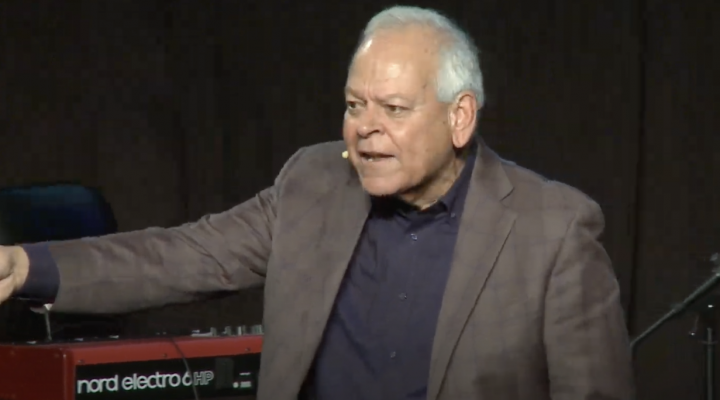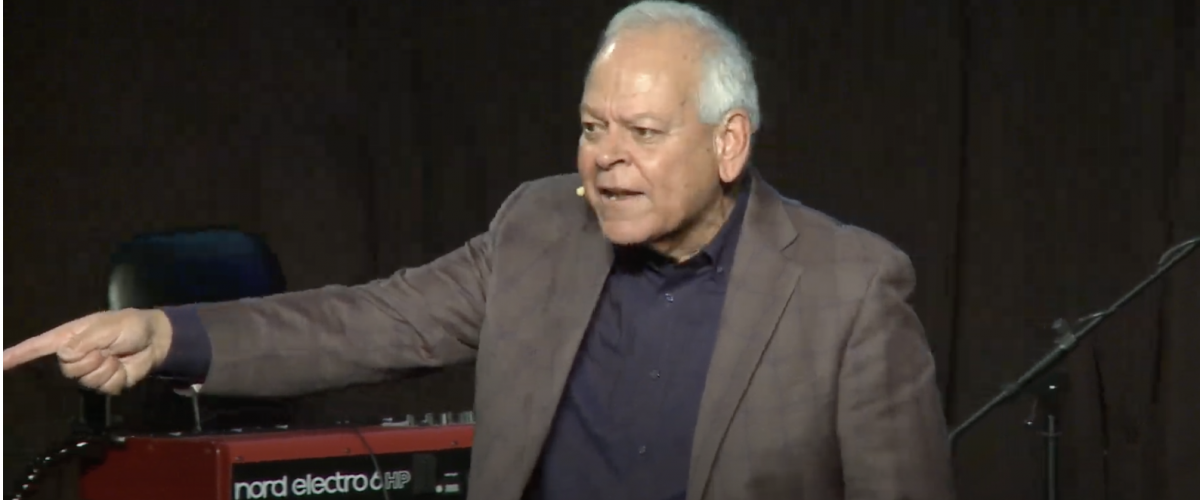A prominent religion reporter has lambasted far-right culture warrior Megan Basham for exposing the name of Johnny Hunt’s alleged sexual abuse victim in her new book.
Evangelical Twitter is lit up with critiques of Basham’s book, Shepherds for Sale, that purports to show the “receipts” for how evangelical pastors have sold their souls to a “woke” agenda. Dozens of evangelical leaders have read the book and responded that she has no receipts at all, just angry accusations that are often incorrect.
In response, Basham has doubled down, engaging with critics on social media and making no apologies for her book, which currently stands at No. 12 in the New York Times listing of nonfiction bestsellers.

Megan Basham
Amid this furor, one of the sharpest critiques has come from Robert Downen, who currently writes for the Texas Tribune but previously covered religion for the Houston Chronicle, where he was the lead writer on the “Abuse of Faith” series that exposed the large-scale coverup of sexual abuse in the Southern Baptist Convention.
On Aug. 8, Downen tweeted: “I’m still working my way through Meg Basham’s new book and will have some thoughts but want to note that she goes out of her way to name the woman who credibly accused former SBC President Johnny Hunt of sex assault. I can’t think of a single journalistic reason to have done so.”
The next day, he expanded the thread: “It is the most basic journalism ethics to not name abuse survivors without consent (barring extraordinary circumstances). There’s not some carve out that says ‘OK, well go for it since their name is buried in a court record or some blog ID’d them.’”
Basham apparently found the name of Hunt’s alleged abuse victim unredacted in a court record and from there decided to publish the name in her book. Hunt, a former SBC president and denominational executive, allegedly took liberties with a much younger pastor’s wife in a seaside condo just weeks after his term as SBC president ended. He has acknowledged the event happened but has described the nature of it differently than the alleged victim has described it.
It is BNG’s policy not to publish the names of alleged abuse survivors without their consent.
Downen argues that is standard journalistic ethics.

Robert Downen
“I’ve seen many people argue that, because the survivor was ID’d in a court record, it’s fair game,” he wrote. “Legally, sure. Ethically? Absolutely not. And this is not an area where there’s any serious debate among serious journalists. Included under the ‘minimize harm’ plank of the professional journalism code: ‘Recognize that legal access to information differs from an ethical justification to publish or broadcast’ and use ‘heightened sensitivity’ for abuse victims.
“Every day, thousands of journalists sift through court records that name victims of domestic, sexual, financial, etc. abuses. Their name appearing on a lawsuit, police report, etc. is not a greenlight to abandon basic ethics. Nor do you get to abandon basic ethics because you find the allegations questionable, or you’ve decided that a victim is less of a victim than they say. Only in rare — RARE — situations would naming such a person be even considered, and if you WERE to do so, you would go to every length possible to contact that person for comment, and to clearly articulate what you planned to write. You’d call and email dozens of time. You’d reach out to their family, lawyers, etc. You’d go to their house. You most certainly would not throw their name in a national bestseller and then justify doing so by mentioning that an attorney ACCIDENTALLY filed their name without a redaction.”
Downen says while investigating abuse allegations in the SBC for the Chronicle, “I almost took a four-hour plane ride + three-hour drive to knock on the door of someone credibly accused of molesting multiple boys just to ensure he knew that we were writing about him. It’s part of the job. I say this because it’s worth contrasting how serious our team took our ethical obligations to an *actual (and later-admitted) pedophile* with Basham’s treatment of a woman alleging sexual assault against a former president of the nation’s second-largest denomination.”

Julie Roys
Julie Roys, who runs a website devoted as a watchdog on abuse in the church, also blasted Basham for a lack of journalistic ethics: “Naming a sex abuse survivor without her consent is completely unethical. @HarperCollins needs to pull @megbasham’s book immediately. I wish I could say I was surprised, but Basham has repeatedly shown disdain for survivors.”
Basham, who was trained in the conservative milieu of World Magazine’s journalism institute, is an online culture warrior who previously worked for conservative evangelical organizations like Focus on the Family. She now works as a culture reporter for the Daily Wire, a far-right online media company.
She is extremely active on social media, frequently lashing out at those she considers “woke” and exchanging fiery rhetoric with her enemies. She has on several occasions taken aim at BNG. She espouses a far-right Calvinistic political and theological agenda that aligns with the extreme wing of the SBC.
Her own publicity for the new book made inflammatory claims such as, “Through years of investigation, Basham uncovered compromise at the highest levels of evangelical leadership” and “For years, the American Church has been overrun with leaders who are selling out their ministries to the highest bidders, giving wolves access to their sheep in exchange for elite respectability.”
Other evangelical pastors and leaders who are cited in the book for allegedly selling out to a liberal cultural agenda have pushed back publicly.

Phil Vischer
One of those is Phil Vischer, creator of the popular Veggie Tales videos for children. Basham takes aim at him for saying discussions about abortion need nuance and for joining other evangelicals in supporting the COVID vaccine. (Basham is a vaccine opponent.)
On his website, Vischer gives a chapter-by-chapter summary of Basham’s claims and views on issues from climate change (no action needed, she says) to illegal immigration (Christians must oppose any path to citizenship, she says) to abortion (should be Christians’ top priority when voting, she says) and an entire chapter railing against Christianity Today magazine.
One of the reasons Basham cavalierly exposed the name of Hunt’s alleged victim, Vischer implies, is that Basham says women cannot be trusted to tell the truth.
His summary of her chapter: “The SBC adopted a process to deal with its own abuse scandal that borrowed ideas from the secular ‘Me, Too’ movement and relied too heavily on ‘victimhood,’ listening to women uncritically, and failing to consider their complicity.”
Vischer concludes his summary with this assessment: “Even more disturbing, to me at least, is Basham’s unyieldingly low view of the motives of virtually every person and institution named in the book. In Basham’s world, no one takes a view contrary to hers with a pure heart or good intentions. The subjects of her writing are, almost without exception, compromising their Christian faith for personal gain. They are seeking ‘the media’s adulation.’ ‘Elite respectability.’ Or just plain filthy lucre. Yes, the book exhibits a vast array of factual and journalistic crimes and misdemeanors. Yes, the transition from favoring carbon credits to working as Satan’s minion is as nonsensical as it sounds. But at its very core, Shepherds for Sale is a profoundly cynical work.”
Related articles:
Johnny Hunt tells his side of the story, including his definition of ‘adultery’
Conservative evangelicals claim they are being persecuted by not being allowed to persecute LGBTQ foster kids | Analysis by Rick Pidcock
Not everyone believes there’s a sexual abuse crisis in the SBC
Sills lawsuit misrepresents a piece of evidence, and that error got highlighted by Ascol and Basham


